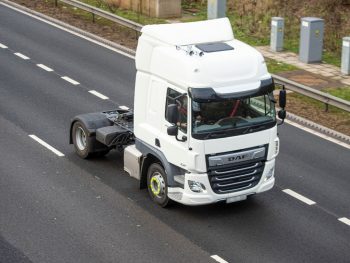Police patrolling the M6 in National Highways’ unmarked HGV cabs caught hundreds of drivers committing offences during a week of action in June.

More than 200 vehicles were stopped as forces along the length of the motorway took part in the multi-agency operation targeting unsafe drivers last month.
The most common offences were, as with previous operations, using a mobile phone (81) and not wearing a seatbelt (54).
From their elevated viewpoint in the unmarked HGV cabs, police officers were able to look across into HGVs or down into cars and vans. Consequences for drivers ranged from warnings to fixed penalty notices, court summons or arrest.
Previous footage released by National Highways and police partners has shown some of the shocking behaviour spotted by officers using the Operation Tramline cabs.
They included a motorist driving along the M40 in the morning traffic applying her make-up while swerving across her lane, oblivious to the police officers alongside her.
Another showed a van driver steering with his knees on the M6 in Warwickshire as he tucked into his fast food – fries in one hand and a drink in the other. A third incident captured a motorist driving along the M40 with a phone in her hand and using the laptop next to her.
The aim of the week of action was to target unsafe drivers and reduce incidents on the motorway. National Highways deals with over 200 reported incidents on the M6 every day – 74,960 on the road in 2023 including 3,808 traffic collisions. The M6 is the longest motorway in the country, and so the crackdown was labelled Operation Vertebrae.
More than 46,150 offences have been recorded by officers in the Operation Tramline HGV cabs since the national safety initiative was launched by National Highways in 2015. The most common offences are not wearing a seatbelt (13,562) and using a mobile phone (11,965).
As well as the drivers spotted by the unmarked cabs, officers from the North West Commercial Vehicle Unit also carried out vehicle checks and stopped 67 vehicles, with a total of 61 offences recorded including weight issues, not complying with drivers’ hours regulations, mobile phone, seatbelt offences and even drugs/drink offences.
Meanwhile, the DVSA stopped vehicles at Cuerden, Lancashire, and Doxey in Staffordshire, where they found 10 overloaded vehicles, drivers working over their permitted hours, without a licence or appropriate documents and even without a tachograph fitted to the HGV. There were 23 immediate HGV prohibitions meaning an issue had to be corrected before the vehicle could continue its journey.
Lisa Scott, National Highways regional road safety programme manager, said: “This was a huge operation, working with a host of our police and road safety partners, to raise awareness of some of the dangerous behaviours taking place on our roads and to persuade those drivers to think again.
“We know that is it a minority of drivers who put themselves at risk but every single person using their mobile phone at the wheel or not putting on their seatbelt is one too many – we want everyone using our roads to get home safely.
“Which is why operations like this are so important to make those drivers reconsider their unsafe driving and to let them know that if they don’t, they face a very real risk of being caught out by police officers patrolling in our unmarked cabs.”

